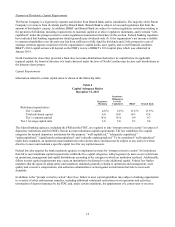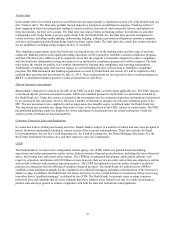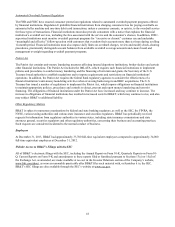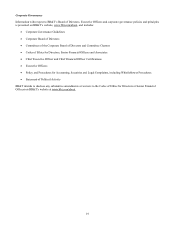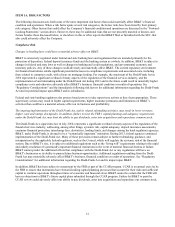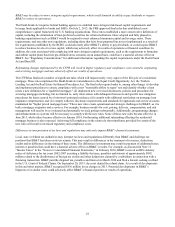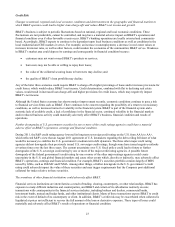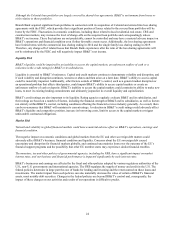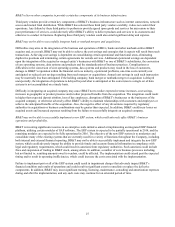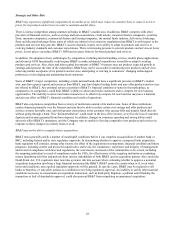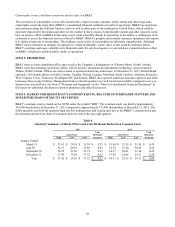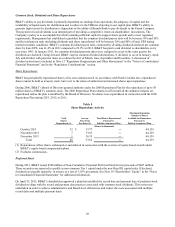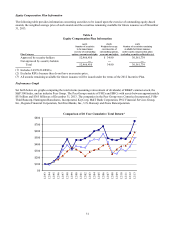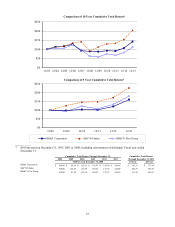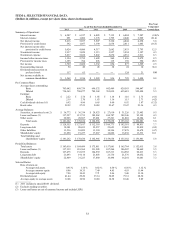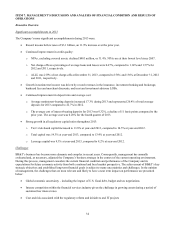BB&T 2013 Annual Report Download - page 24
Download and view the complete annual report
Please find page 24 of the 2013 BB&T annual report below. You can navigate through the pages in the report by either clicking on the pages listed below, or by using the keyword search tool below to find specific information within the annual report.24
Although the Colonial loan portfolios are largely covered by shared-loss agreements, BB&T is not immune from losses or
risks relative to these portfolios.
Branch Bank acquired significant loan portfolios in connection with its acquisition of Colonial and entered into loss sharing
agreements with the FDIC, which provide that a significant portion of losses related to the covered loan portfolios will be
borne by the FDIC. Fluctuations in economic conditions, including those related to local residential real estate, CRE and
construction markets, may increase the level of charge-offs on the acquired loan portfolio and correspondingly reduce
BB&T’s net income. These fluctuations are not predictable, cannot be controlled and may have a material adverse impact on
BB&T’s operations and financial condition even if other favorable events occur. Additionally, the loss sharing agreements
have limited terms with the commercial loss sharing ending in 2014 and the single family loss sharing ending in 2019.
Therefore, any charge-off of related losses that Branch Bank experiences after the term of the loss sharing agreements will
not be reimbursed by the FDIC and will negatively impact BB&T’s net income.
Liquidity Risk
BB&T’s liquidity could be impaired by an inability to access the capital markets, an unforeseen outflow of cash or a
reduction in the credit ratings for BB&T or its subsidiaries.
Liquidity is essential to BB&T’s businesses. Capital and credit markets continue to demonstrate volatility and disruption, and
if such volatility and disruption continues, worsens or abates and then arises at a later date, BB&T’s ability to access capital
could be materially impaired. Additionally, other factors outside of BB&T’s control, such as a general market disruption or
an operational problem that affects third parties, could impair BB&T’s ability to access capital markets or create an
unforeseen outflow of cash or deposits. BB&T’s inability to access the capital markets could constrain its ability to make new
loans, to meet its existing lending commitments and ultimately jeopardize its overall liquidity and capitalization.
BB&T’s credit ratings are also important to its liquidity. Rating agencies regularly evaluate BB&T and its subsidiaries, and
their ratings are based on a number of factors, including the financial strength of BB&T and its subsidiaries, as well as factors
not entirely within BB&T’s control, including conditions affecting the financial services industry generally. As a result, there
can be no assurance that BB&T will maintain its current ratings. A reduction in BB&T’s credit ratings could adversely affect
BB&T’s liquidity and competitive position, increase its borrowing costs, limit its access to the capital markets or trigger
unfavorable contractual obligations.
Market Risk
Turmoil and volatility in global financial markets could have a material adverse effect on BB&T’s operations, earnings and
financial condition.
The negative impact on economic conditions and global markets from the EU and other sovereign debt matters could
adversely affect BB&T’s business, financial condition and liquidity. Concerns about the EU sovereign debt caused
uncertainty and disruption for financial markets globally, and continued uncertainties loom over the outcome of the EU’s
financial support programs and the possibility that other EU member states may experience similar financial troubles.
The monetary, tax and other policies of governmental agencies, including the FRB, have a significant impact on market
interest rates, and our business and financial performance is impacted significantly by such interest rates.
BB&T’s businesses and earnings are affected by the fiscal and other policies adopted by various regulatory authorities of the
U.S., non-U.S. governments and international agencies. The FRB regulates the supply of money and credit in the U.S. The
federal policies determine in large part the cost of funds for lending and investing and the return earned on those loans and
investments. The market impact from such policies can also materially decrease the value of certain of BB&T’s financial
assets, most notably debt securities. Changes in the federal policies are beyond BB&T’s control and, consequently, the
impact of these changes on our activities and results of our operations is difficult to predict.


